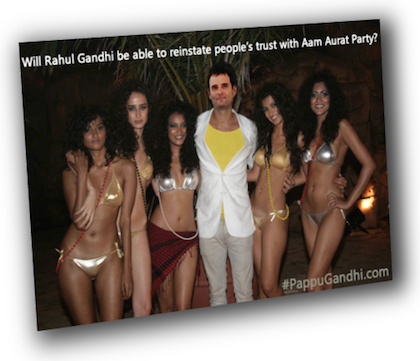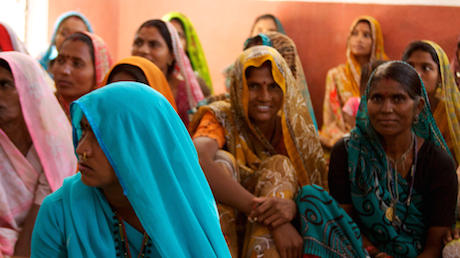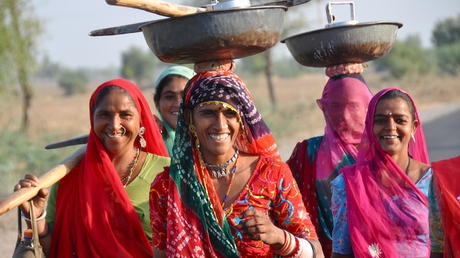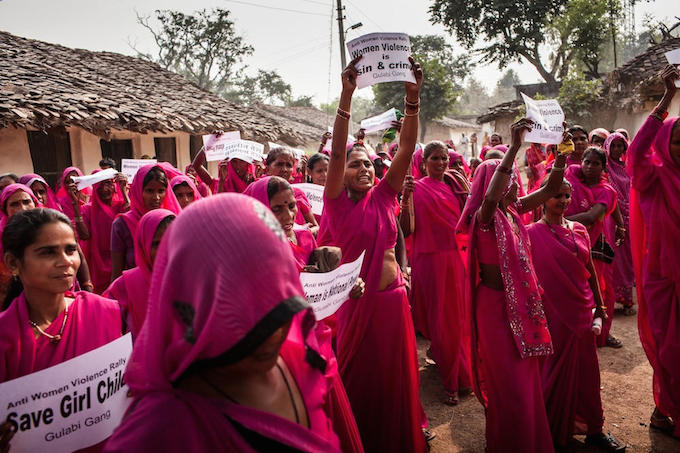So what’s been cooking in these epic Indian national elections?
- A huge quantity of machismo.
- Copious amounts of self-righteous morality.
- A generous sprinkling of jingoistic patriotism.
- A dollop of misogyny.
All up, a recipe for disaster that reveals just how entrenched gender power relations remain in India.
Even cursory analysis of the social media commentary and traditional media language around the election exposes some confronting truths about patriarchal mindsets and violent gender norms.
One, the notion that women are second-class citizens whose personal lives are public property is still woven deeply into the fabric of the country.
Two, sexist or misogynist commentary or behaviour is not only acceptable, but a legitimate strategy against a political opponent.
Three, the language of violence against women is normalised in the present political climate.
And four, underlying it all, the message that we can do with fewer women in the political scene and in the Parliament.
This Indian campaign is distinguished by an astonishingly rampant and aggressive display of competing masculinities. This has been assisted by the absence of any female contender for the top position of the country. (Mayawati’s name was being circulated during the last Lok Sabha elections in 2009 as a possible PM front-runner should a strong third front emerge).
The general tone is neatly, if cruelly, captured by one commentator enlisting some of the nicknames being bandied about in his portrayal of the contest being between a Pappu (a dimwitted, unschooled ‘boy’ – Rahul Gandhi); a Phenku (braggart Narendra Modi, with an overdose of ‘manliness’) and a Paltu (the runaway activist, Arvind Kejriwal) looming in the background.
The highly gendered language, the violent masculinity on display and the disregard for civility has shattered any hopes, or illusions, of a changing public discourse about gender equality and women’s rights in India.
Competing masculinities
Masculinity has permeated the election lexicon more blatantly than ever before. For example, the preoccupation with Rahul Gandhi’s perceived lack of manliness versus Narendra Modi’s thumping of his ‘56 inch ka seena’ (muscular chest of 56 inches).
It’s a narrative that builds on former Kerala Chief Minister, V S Achuthananadan’s goading of Rahul Gandhi as an ‘Amul baby’ (,an infant fed on Amul’s products) and the political satirists obsession with his IQ Meanwhile his opponent Modi declares himself ‘man enough’ to save India from external and internal threats.
Rahul is frequently portrayed in the social and mainstream media, by his detractors, as a soft, effeminate, indecisive politician who has had leadership thrust upon him (an odd contrast to his own grandmother, Indira Gandhi who embodied masculine values and was referred to as the only ‘man’ in her cabinet). In fact, Modi is also considered to be embodying the style of authoritarian leadership like Indira Gandhi and Sanjay Gandhi. Pappu is a weakling, a buddhu (idiot) according to BJP leader, Subramanyam Swamy, who rebukes Gandhi in public. (His twitter feeds are full of his jibes).
 A website dedicated to satirising Rahul Gandhi (left) declares his desire to form an Aam Aurat Party (Common Woman’s Party) in response to Kejriwal’s AAP (Common Man’s Party), with a ladies pocket mirror (‘bitch please’ inscribed on it) as its election symbol.
A website dedicated to satirising Rahul Gandhi (left) declares his desire to form an Aam Aurat Party (Common Woman’s Party) in response to Kejriwal’s AAP (Common Man’s Party), with a ladies pocket mirror (‘bitch please’ inscribed on it) as its election symbol.
The candidates of the Aam Aurat Party, according to this website, would include women porn stars, models and film actors. In addition to these online indignities Gandhi is shown as completely protected by his mother, Sonia Gandhi and sister, Priyanka Gandhi.
Priyanka’s campaign to save Rahul’s electoral prospects in Amethi could not have come at a worst time. She is a media favourite who manages to occasionally roar back at Modi, reminding people of the similarity with her powerful grandmother. But she has eclipsed her brother’s campaign in his own constituency, lending credence to the view that Rahul is incapable of fighting it out on his own, his emasculation complete.
When Congress party’s senior leader, Digvijay Singh, announced his relationship with a woman 25 years younger to him, the joke in social media that went viral said, “that awkward moment when Rahul Gandhi realises even Digvijay Singh has a girlfriend!”
If the notion that Rahul Gandhi has not graduated from boyhood to manhood is predominant, it is also seen as an extension of the personality of current Congress PM, Manmohan Singh, who is also represented as an emasculated figure. Stand-up comedians get mileage out of mocking Manmohan Singh as too docile (especially as he listens to a woman party leader, Sonia Gandhi).His manliness compromised because of his goodness., he is even called a ‘fake’ Sikh for being servile to the Gandhi family
Narendra Modi’s raging masculinity captures headlines and is more scrutinised/appreciated than his policy prognosis. His legion of social media admirers is openly and flagrantly misogynistic. Modi, they argue, will restore manliness and glory to the position of the Prime Minister. As prominent (female) Indian journalist and commentator Barkha Dutt writes, “many of these online diatribes [from Modi supporters] are located within the larger culture of aggression that seems to be the dominant political style of the day, across party lines”.
While men’s masculinity is being questioned, for women it’s their sexual morality.
Modi detractors also play the man, so to speak. Tabloid writer Shobha De, muses about his sexuality and masculinity and why women would not marry him. “My worry is that he looks as if he doesn't care a damn about any kind of sexuality - metro, new age, whatever. Power is sex for Modi,” she says. Despite his masculinity and physique, no woman would marry a man so self absorbed and fearsome, argues De.
The masculinity preserving, marriage-denying Modi was called impotent by Congress leader, Salman Khurshid. On the Gujarat riots Khurshid said, “some people came, attacked and went, and you [Modi] couldn't protect. Are you not a strong man?"
Modi has had no hesitation in flaunting his masculinity. On the issue of violence against women, he reportedly said that, “the protection of ‘mothers and sisters’ was a big issue before the Indian society, and if women were feeling insecure, the Indian men had no right to call themselves "mard" (men).
In an online ad campaign by the Modi camp , the issue of sexual harassment of women is addressed under the rhetoric of ‘protection’ and ‘safety’ of women being a complete male responsibility. Instead of confronting a group of “eve teasers”, the young women in the video meekly walk away. The emboldened men grab a woman and see her Modi t-shirt which says ‘security is my responsibility, good governance my goal’. The men – frightened at the mere sight of a Modi t-shirt - let her go and the background voice requests people to make Modi victorious.
Modi is the super hero, saviour of all the women of India. This is enough to get the blood boiling of those feminists and activists who have laboured to drive the point that women’s freedom cannot be sacrificed in the name of security, which only entrenches gender norms and violence.
Women’s lives = public property
These elections have thrown up many examples of women being humiliated publicly for not conforming to patriarchal expectations.
The controversy over Narendra Modi deliberately leaving out his wife’s name on his previous electoral nomination forms had less to do with the violation of nomination procedures and more to do with speculations about his relationship status and whether the marriage had been consummated.
Discussions in the media struggled to demonstrate its relevance and most interpretations were keen to construct Jasodaben’s ‘victimhood’ as an abandoned wife whose husband had failed in his responsibility towards her.
Left progressives and some feminists also participated in this discussion, not wasting an opportunity to remind the country that a man who failed to recognise the rights of his spouse could never be a good leader. It was entirely irrelevant to those who wanted to ‘rescue’ Jasodaben, that she avoided the media glare and issued no statement about being ill-treated. She has been continuously hounded with people ready to speak on her behalf.
While men’s masculinity is being questioned, for women it’s their sexual morality. Yoga guru. Baba Ramdev, a supporter of Modi, made a comment about Rahul Gandhi honeymooning and picnicking with Dalit women. Samajwadi Party leader, Mulayam Singh Yadav, wanted to know what the best way was to address BSP leader, Mayawati: Miss, Mrs or Sister. His associate and UP Women’s Welfare Board president, Leelawati Kushwaha had no comforting words for an outraged Mayawati, instead suggesting that Mayawati should go for a virginity test since she continued to be addressed as ‘Miss’.
Mulayam Singh Yadav’s transgressions are many. While addressing a public rally in Barabanki, he said, `“only women from the affluent classes can get ahead in life, but remember you rural women will never get a chance because you are not that attractive.”
It was Mulayam who infamously said, of rapists, that ‘boys will be boys’ and they make mistakes. Politicians too seem to be ‘men’ who will be ‘men’ and testosterone levels are more important than policies and manifestoes.
The regressive views about women are more the norm than exception. Congress MP Sanjay Nirupam – during a TV broadcast - admonished BJP spokesperson and TV actor, Smriti Irani, thus: “shaking your hips on TV till yesterday, and now you have become a psephologist.”
During the last Lok Sabha polls, actress and politician Jaya Prada had her photo-shopped nude photos and CDs circulated on the instructions of her own party member, Azam Khan. Humiliating women knows no boundaries in the struggle for power.
In the world’s largest democracy, we are very forgiving about our political class ill-treating women, much too tolerant of sexism and misogyny and sanctimonious enough to demand that women live by archaic and patriarchal sexual morals to preserve our ‘cultural’ values. Democracy exacts a heavy price from half of its own citizens.
A democracy without women?
Instead of debating serious policy options to end violence against women and gendered abuse, the vicious election campaign reinstates every bit of patriarchy and misogyny that women’s groups, feminists and ordinary women and men are resisting at an everyday level.
This campaign was a great opportunity for Indians to demonstrate commitment to gender equality and to end violence and abuse. Instead our political class has endorsed and perpetuated every gender stereotype, adopted violent language in the public space, put women on trial and competed with one another in public displays of misogynistic behaviour and comments.
Meanwhile women remain grossly underrepresented in the electorate and in the parliament. About half of India’s Lok Sabha constituencies have never elected a woman. India ranks at 112 among 189 countries in a list of countries that include women parliamentarians. With a mere 11.4% women in both houses of Parliament, and no discussions or commitments on the women’s reservation bill by any political party, the world’s largest democracy is way behind countries such as Afghanistan (27.6%) and Pakistan (18.5%).
India’s degenerated political discourse is merely reflective of a deeper malaise in the society, where gender norms are entrenched in very violent ways. The ‘change’ in the political climate is evident; for any changes in women’s lives or gender perceptions we will have to rethink a mindset ‘revolution.





